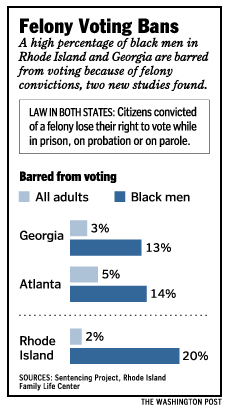Felon Disenfranchisement in the U.S.
How the facts differ between states
- Number of states that deny the vote, for life, to all people with felony convictions even if they have completed their sentences: 3
- Number of states that deny the vote to some or all of their citizens who have completed their sentences: 9
- Number of states that disenfranchise prisoners convicted of a felony: 48
- Number of states that disenfranchise felony probationers: 31
- Number of states that disenfranchise people on parole: 36
Source: www.prisonpolicy.org
American Blackout: Discussing patterns of voter disenfranchisement
A Canadian perspective
As a Canadian citizens, we don't have to worry too much about this problem in our society, but, as our neighbours to the south gear up for another election, I can't help but wonder abouit something that I find one of the most puzzling aspects of American society. Many Americans might be surprised to learn that an overwhelming two percent of their fellow citizens are ineligible to vote.
In today's United States, as many as 4.7 million citizens have had their voting rights revoked due to conviction of a felony crime. These crimes can range from murder to cheque forging. Some criminals may have served little or no jail time. Felon disenfranchisement is an outdated law older than the Republic itself.
The idea that criminals should sacrifice their political rights dates back to early Rome. The British also adopted these ideas during the 17th and 18th centuries and American colonists brought them to the Americas. When the American Republic was founded only a small fraction of the public had any voting rights. This right depended on how valuable a member of society you were, which resulted in only white males over the age of 21 being allowed to cast their vote. Women, people of colour, and the poor were universally excluded.
It is ultimately a ploy on the part of the U.S. government to exclude undesirable members of society from fully executing their right to have a say in the future of their country. There are arguments that the logic of these laws is elusive. It is understandable to keep convicted child molesters away from children, or to forbid an embezzler from working at a bank, however many people feel that a basic human right such as voting is something that is needed to return to democratic society.
Public opinion points strongly in favour of restoring ex-felons voting rights, with 80% of the American public supporting restoration of rights to convicts who have completed their sentences, and 64% and 62% respectively supporting the rights of probationers and parolees. In contrast to these polls, currently 48 states bar prison inmates from voting, with 32 and 28 states respectively prohibiting parolees and probationers.
Of the 4.7 million convicts who have had their rights revokes, only 27% are currently incarcerated. Between Florida and Texas alone, 1, 000, 000 US citizens are unable to cast their vote. Thirteen percent of the African-American population, and an increasing number of Latino men are excluding from voting, substantially decreasing the power of the Black and Latino vote.
U.S. representative John Conyers is quoted as saying "If we want former felons to become good citizens, we must give them rights as well as responsibilities, and there is no greater responsibility than voting". Common sense, one would assume. Then why are issues of this nature moving backwards?
Many people hold the misconception that ex felons don't care about politics. This is simply not true. Many former criminals have children and families they simply want the best that life has to offer them, just like any member of society.
Why should someone pay for a mistake for the rest of his or her life? In my mind, if the law considers these people rehabilitated enough to rejoin society, then they are just as affected by the actions of the government as anyone else and deserve to become a part of government decision-making.

Useful Links
- Felon Voting Quiz
Test your knowledge on felony voting issues. You might be unpleasantly surprised at some of these answers! - Sentencing Project
Research and advocacy for reform. - Prison Policy Initiative
Non-profit organization documenting the effects of mass incarceration on society.




